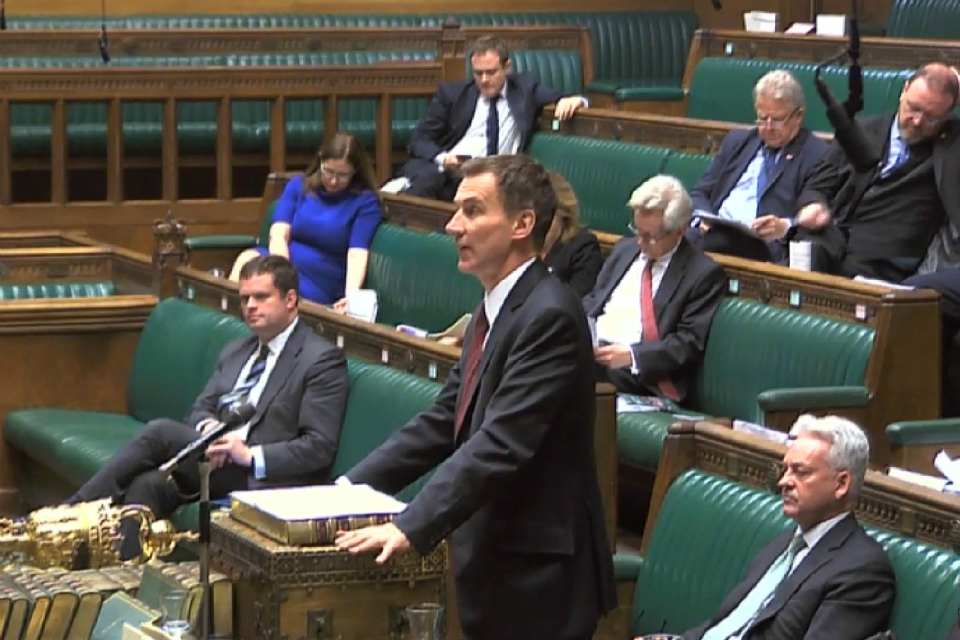Political settlement to the war in Yemen: Foreign Secretary's statement
Jeremy Hunt gave a statement in Parliament on how the UK will continue to use diplomatic and humanitarian tools to help settle this terrible conflict.

Mr Speaker, with permission I will make a statement on the quest for a political settlement to the war in Yemen. Last week, the Houthi rebels and the Government of Yemen held their first direct peace talks since 2016. The negotiations in Stockholm reached agreement on a ceasefire in the port city of Hodeidah and a mutual redeployment of forces, monitored by the United Nations.
As we look forward to Christmas, the people of Yemen are enduring one of the gravest humanitarian crises in the world. Hunger and disease are ravaging large areas of the country: 420,000 children have been treated for malnutrition; as many as 85,000 have starved to death.
Today, 24 million Yemenis – more than 85% – need help.
Behind these stark, impersonal numbers lie real people – individual men, women and children – with hopes and aspirations no different from our own.
Their ordeal is not the result of natural disaster or misfortune. This is a suffering a man-made calamity, imposed by a war that has torn the country asunder and reduced its people to penury.
Hence the imperative need to resolve this conflict as rapidly as possible.
From the beginning, Britain has made every effort to promote a political solution.
Last month, I travelled to Saudi Arabia and the United Arab Emirates, who lead the coalition fighting to restore Yemen’s legitimate government. I later visited Iran, which supports the Houthi rebels.
In every capital, I urged my counterparts to use all their influence to help bring the parties to the negotiating table. After my visit to the region, agreement was reached for 50 wounded Houthis to be evacuated from Yemen to Oman, a confidence-building measure intended to pave the way for peace talks.
On 19 November, I instructed our mission at the United Nations to circulate a draft Resolution to the Security Council, reinforcing the need for a political settlement and demanding the unhindered flow of food and medicine throughout Yemen.
On 6 December, the peace talks began in Stockholm, mediated by Martin Griffiths, the UN Special Envoy. Last Wednesday, I travelled to Stockholm myself and the following day I met the leaders of both delegations. I was the first British minister to meet representatives of the Houthis.
I urged the parties to seize the opportunity to reach agreements that would ease the suffering of the Yemeni people and move closer towards the goal of ending the war.
Last Thursday, the talks concluded with an agreement for the parties to meet again in January and to build trust by releasing thousands of prisoners.
Honourable Members will note the importance of the agreement on a ceasefire and redeployment in Hodeidah. This port is the lifeline of Yemen, and a channel for at least 70 percent of the country’s food imports.
The ceasefire in Hodeidah port and city came into effect at midnight yesterday and the UN Special Envoy has reported that it seems to be working. If the ceasefire continues to hold and the UN succeeds in increasing the volume of traffic through the port, this should reduce the level of suffering. I have urged all parties to stick to the terms agreed last week in Stockholm so that we can find a lasting political solution to this devastating conflict.
After the Stockholm talks, I spoke about the next steps to the UN Secretary General, Antonio Guterres, and the foreign ministers of Saudi Arabia and the UAE. Earlier, I discussed the situation with Secretary Pompeo of the United States.
Based on these consultations – and the success of the peace talks – I have instructed our mission in New York to resume working on our draft Resolution with Security Council partners, with a view to adopting it later this week. We will ask the Security Council to vote on the draft within the next 48 hours.
The British text aims to build on the momentum generated in Stockholm by endorsing the agreements reached between the parties, authorising the UN to monitor their implementation, and setting out urgent steps to alleviate the humanitarian crisis.
Our aim is to mobilise the collective weight of the UN behind the progress that’s been made.
I am grateful to Martin Griffiths for his dogged efforts, which are nothing short of heroic. I acknowledge the seriousness of purpose of the delegations from both sides who I met in Stockholm last week.
And I offer my thanks to the British diplomats, both in the region and in the Foreign Office in London, who have worked assiduously behind the scenes to bring the parties together.
Britain has been able to play this role because of our network of friendships, including our partnership with Saudi Arabia and the UAE, and because we are a country that steps up to its responsibilities.
While the House can draw encouragement from recent events, I don’t not wish to give false hope. The positive steps could be reversed; the ceasefire is highly fragile.
Many complex and difficult problems have yet to be addressed, let alone resolved. The people of Yemen still carry an immense burden of suffering.
And although we have had some at the end of the tunnel, but Yemen is still in the tunnel.
For as long as necessary, this country will continue to use all the diplomatic and humanitarian tools at our command to help settle this terrible conflict. Our values demand no less.
I commend this statement to the House.